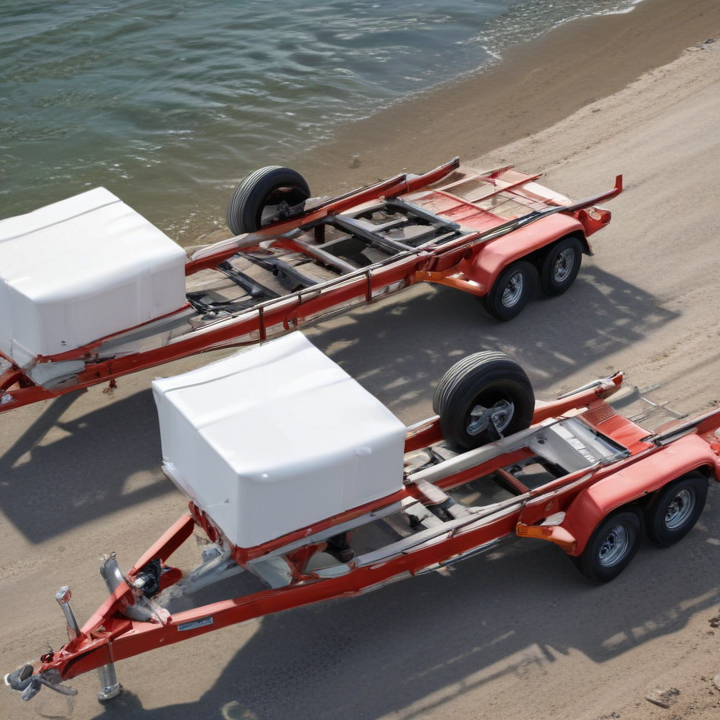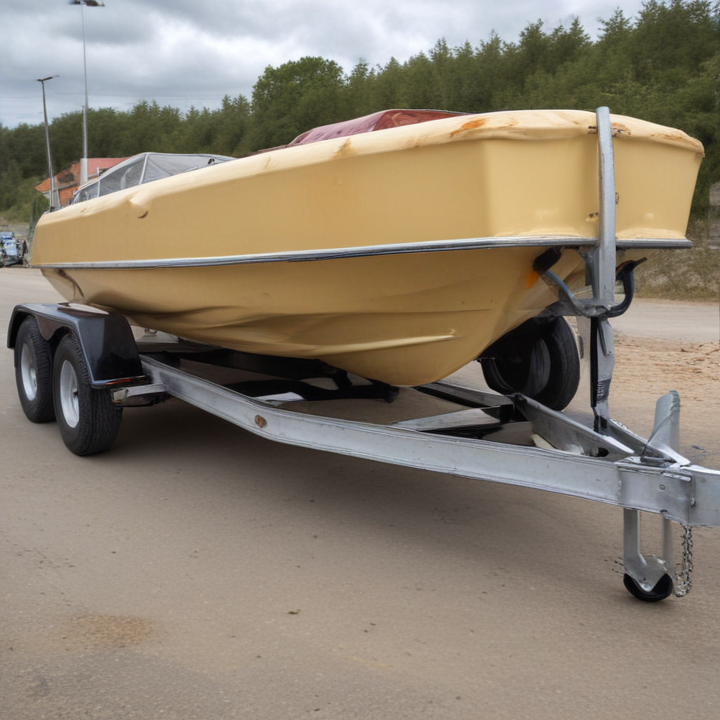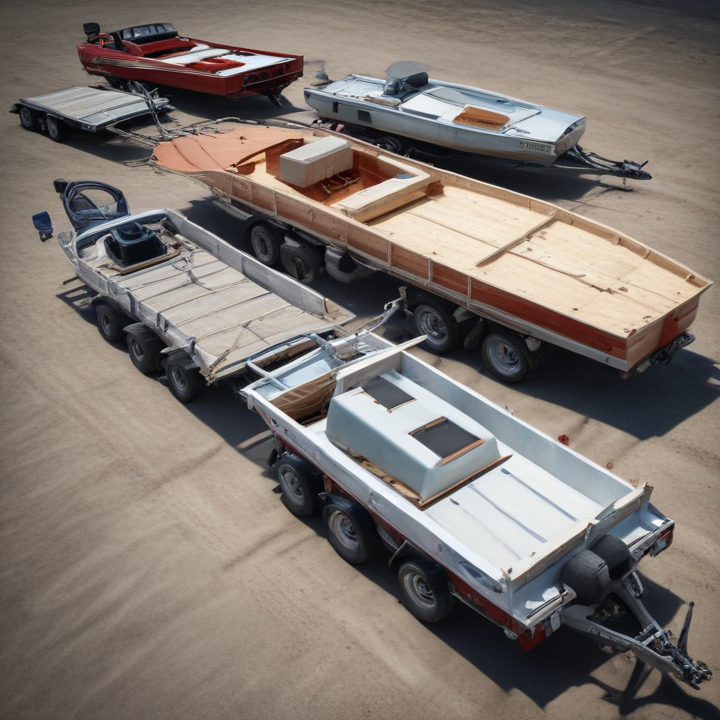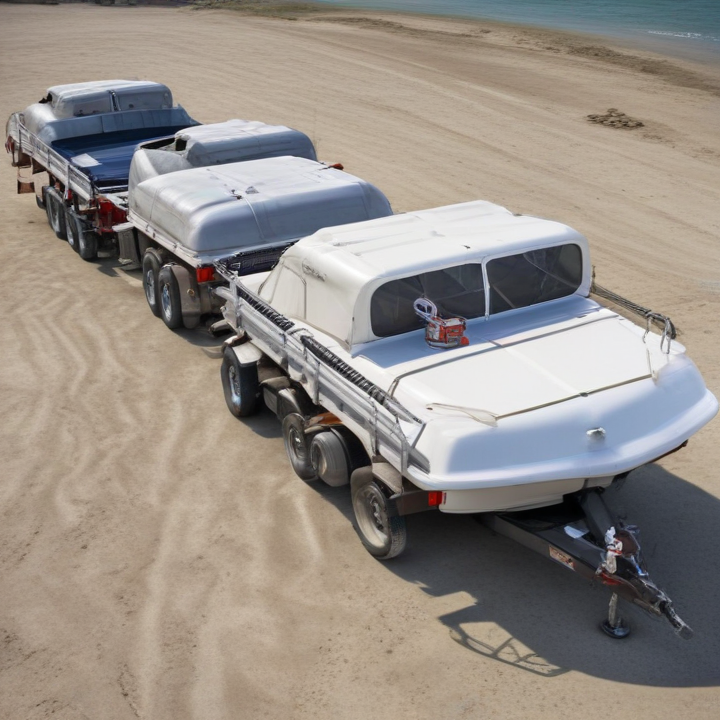Boat Trailers Safety Certifications
Safety certifications for boat trailers are essential for ensuring both compliance with legal standards and the safety of road users. In many countries, boat trailers must adhere to regulations set by transportation authorities. In the United States, for instance, trailers are subject to guidelines outlined by the National Highway Traffic Safety Administration (NHTSA).
Key aspects of these certifications often include:
1. Construction Standards: Materials used and the structural integrity of the frame, axles, and hitch must meet specified requirements to prevent failures under load.
2. Lighting and Reflectors: Trailers must have proper lighting, including brake lights, turn signals, and reflectors, to ensure visibility in various conditions.
3. Braking Systems: Depending on the weight, some trailers require brakes on one or more axles. These systems must be tested and certified to ensure they can effectively stop the trailer.
4. Weight Capacity: Manufacturers must clearly indicate the Gross Vehicle Weight Rating (GVWR) and ensure that the trailer’s frame and components can handle the stated load.
5. Safety Chains: Trailers should have safety chains that meet strength standards, serving as a backup in case the hitch fails.
6. Tires and Wheels: Only tires and wheels that meet certain specifications for load ratings and durability can be used on certified trailers.
In the European Union, the European Community Whole Vehicle Type Approval (ECWVTA) system provides a similar framework. Trailers must pass stringent tests to gain approval, ensuring they meet safety and environmental standards.
Certifications are usually conducted by accredited third-party agencies. Always look for marks of compliance when purchasing a trailer, and consult local regulations to ensure your trailer is road-legal and safe. Regular maintenance and adherence to these standards help prevent accidents and prolong the lifespan of your boat trailer.
List Reference Technical Parameters of “Boat Trailers”
Reference Technical Parameters of Boat Trailers
1. Load Capacity: Indicates the maximum weight the trailer can safely support, typically ranging from 500 to 15,000 pounds (220 to 6,800 kg).
2. Gross Vehicle Weight Rating (GVWR): The maximum permissible weight of the trailer, including its own weight plus the load. Varies widely based on trailer design and use.
3. Trailer Weight: The weight of the empty trailer. This parameter is crucial for calculating the total weight the vehicle will tow.
4. Dimensions:
– Length: Varies based on boat size, typically 14 to 40 feet (4.3 to 12 meters).
– Width: Usually 6 to 8.5 feet (1.8 to 2.6 meters).
– Height: Varies with the type of boat and trailer design.
5. Axle Configuration: Single, tandem, or triple axles, impacting load distribution and stability.
– Single Axle: Common for small boats, easier to maneuver.
– Tandem Axle: Better load distribution, improved stability for mid-sized boats.
– Triple Axle: Used for larger, heavier boats to distribute weight more effectively.
6. Brake System: Types include surge brakes and electric brakes.
– Surge Brakes: Activated by the trailer’s inertia.
– Electric Brakes: Controlled via the towing vehicle’s brake controller.
7. Suspension Type: Leaf spring or torsion axle.
– Leaf Spring: Traditional, durable, and less expensive.
– Torsion Axle: Provides independent suspension for a smoother ride.
8. Tire Specifications: Size, load range, and type (bias-ply or radial). Critical for ensuring safe and stable towing.
9. Lighting and Electrical: Compliance with legal requirements for tail lights, brake lights, and turn signals. Often 12V systems.
10. Material and Coating: Galvanized steel, aluminum, or painted steel. Galvanized steel and aluminum are preferred for saltwater use due to corrosion resistance.
11. Winch Capacity: Determines the maximum weight that the winch can pull, crucial for loading and unloading the boat.
12. Bunk or Roller System: Supports the boat during transport.
– Bunk Trailers: Use carpeted wood or synthetic bunks.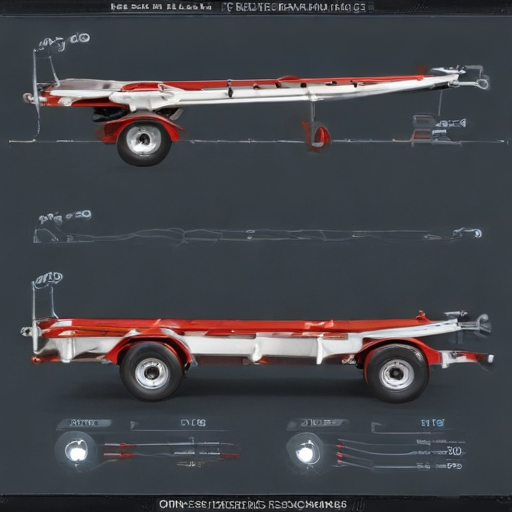
List Product features of “Boat Trailers”
Boat trailers are essential accessories for transporting boats safely and efficiently. Here are some key product features of boat trailers:
1. Material: Typically constructed from galvanized steel or aluminum for durability and resistance to corrosion.
2. Load Capacity: Varies according to size and design, supporting small dinghies to large yachts.
3. Axle Configurations: Single, tandem, or tri-axle depending on the weight and type of boat.
4. Brakes: Equipped with surge or electric brakes for increased safety during transit.
5. Suspension System: Leaf springs or torsion axles to absorb road shocks and provide a smooth ride.
6. Bunks and Rollers: Adjustable carpeted bunks or rubber rollers to support the boat’s hull and facilitate easy loading and unloading.
7. Winch: Hand or electric winch for pulling the boat onto the trailer.
8. Lighting: Integrated LED lights for visibility and compliance with road regulations.
9. Tie-down Points: Multiple tie-down points to secure the boat firmly during transport.
10. Adjustable Components: Adjustable width and length to accommodate different boat sizes.
11. Safety Chains: Provide an extra layer of security by attaching the trailer to the tow vehicle.
12. Guide Posts: Help align the boat during loading and unloading.
13. Bearings and Wheels: Sealed bearings and high-quality tires for smooth operation and long life.
14. Keel Support: Provides additional support to the boat’s keel, preventing damage during transport.
15. Swing-away Tongue: Some models have a swing-away tongue for easier storage in tight spaces.
16. Non-slip Surface: Trailers often feature non-slip surfaces to prevent slippage during handling.
17. Customization Options: Some trailers offer customization features to tailor to specific boating needs.
These features collectively ensure that boat trailers are safe, reliable, and easy to use, offering boat owners peace of mind when transporting their vessels.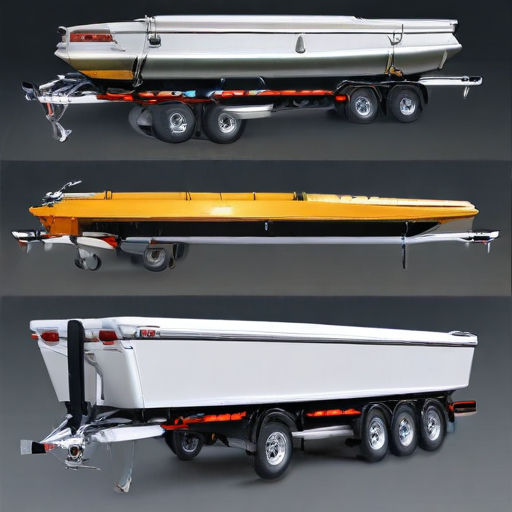
List Application of “Boat Trailers”
Boat trailers are specialized types of trailers designed to transport boats safely and efficiently. Here are some key applications of boat trailers:
1. Transportation: Primarily, boat trailers are used to transport boats from one location to another, whether it’s from a storage facility to a water body or from one water body to another. This includes transporting boats over long distances for events, vacations, or relocations.
2. Launching and Retrieving: Boat trailers facilitate the launching and retrieving of boats from the water. Adjustable trailer designs allow for easy loading and unloading, which simplifies the process of getting boats into and out of the water at ramps and docks.
3. Storage: When not in use, boat trailers can serve as a storage solution. They keep boats off the ground, protecting the hull from damage and allowing for more convenient storage in driveways or garages.
4. Maintenance and Repairs: Using a boat trailer makes it easier to perform maintenance and repairs on the boat. With the boat elevated and mobile, tasks such as hull cleaning, painting, and mechanical repairs can be conducted more conveniently.
5. Emergency Use: In situations where a boat needs to be quickly removed from the water, such as impending severe weather or potential damage, boat trailers provide a swift and effective evacuation method.
6. Boat Shows and Exhibitions: Boat manufacturers and dealers use trailers to transport boats to trade shows, exhibitions, and promotional events. This allows showcasing the boats in various locations without them being water-bound.
7. Fishing and Recreation: Enthusiasts who engage in recreational boating or fishing often use boat trailers to access different water bodies. This flexibility permits them to explore diverse fishing spots and recreational areas.
8. Versatility: Some boat trailers are designed for multiple uses and can accommodate various types of boats, from small fishing boats to larger sailboats, offering a versatile solution for boat owners with diverse fleets.
In summary, boat trailers play an essential role in transporting, launching, storing, maintaining, and showcasing boats, offering crucial support to boat owners, manufacturers, and recreational users alike.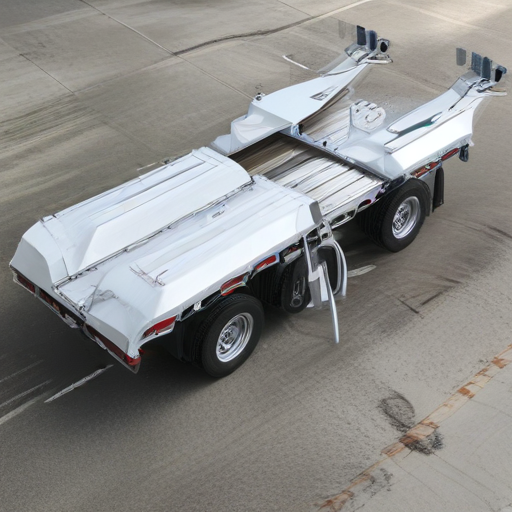
List Various Types of “Boat Trailers”
Boat trailers come in various designs to cater to different types of boats and specific transportation needs. Here are some common types:
1. Bunk Trailers: These are constructed with padded bunks that conform to the boat’s hull, providing excellent support and stability. Ideal for fiberglass boats, they offer easy loading and unloading.
2. Roller Trailers: Equipped with multiple rollers, these trailers make launching and retrieving boats effortless. Best suited for shallow ramps, they allow for smooth and quick operations, often favored for smaller boats.
3. Float-On Trailers: Designed for easy loading, these trailers enable the boat to float above the trailer’s structure. They are particularly effective in deep water and reduce the risk of hull damage during loading.
4. Pontoon Trailers: Custom-made for pontoon boats, these trailers come with widely spaced bunks or platforms that accommodate the unique flat-bottomed design of pontoons.
5. PWC Trailers: These smaller trailers are specifically built for personal watercraft like jet skis. They provide tailored support and easy maneuverability.
6. Sailboat Trailers: Crafted for sailboats, these trailers often include specialized supports for the keel and hull, as well as brackets for the mast.
7. Multihull Trailers: For catamarans and trimarans, these trailers offer wider frames and supports to accommodate the multi-hull design, ensuring secure transport.
8. Kayak/Canoe Trailers: These lightweight trailers are designed to carry kayaks and canoes, featuring racks that securely hold multiple boats.
9. Utility Trailers: Versatile and multipurpose, utility trailers can also transport small boats when outfitted with the right accessories.
10. Folding Trailers: These trailers can be folded or collapsed for easy storage, making them ideal for those with limited space.
In summary, choosing the right boat trailer depends on the boat type, size, and the specific requirements for transportation and storage. Each type offers unique features to ensure safe and efficient handling of your watercraft.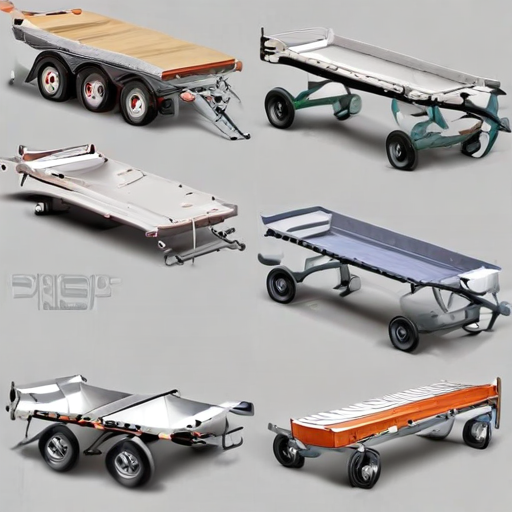
Boat Trailers Accessories Upgrades and Custom Manufacturing Options
Boat trailer accessories and upgrades are essential for enhancing functionality, safety, and convenience. Custom manufacturing options also ensure tailored solutions for specific needs. Here’s a brief overview:
Accessories and Upgrades:
1. Winches: Upgrading to electric winches can make loading and unloading significantly easier.
2. Lighting: LED tail and marker lights ensure better visibility and comply with road safety standards.
3. Brake Systems: Hydraulic or electric brake systems provide better control and safety.
4. Bunks and Rollers: Adjusting or upgrading to self-aligning bunks or rollers eases launching and retrieving the boat.
5. Tires and Rims: High-quality, heavy-duty tires and corrosion-resistant rims improve durability and performance.
6. Tie-Down Straps: Heavy-duty straps ensure the boat is securely fastened during transit.
7. Guide-Ons: Side and keel guide-ons assist in aligning and stabilizing the boat during loading.
8. Jack Stands and Dollies: Adjustable jack stands aid in leveling, while dollies assist in maneuvering the trailer.
Custom Manufacturing Options:
1. Frame Design: Custom frames can accommodate specific boat sizes and hull designs, optimizing support and fit.
2. Material Choices: Options like galvanized steel, aluminum, or stainless steel provide varying levels of strength and corrosion resistance.
3. Suspension Systems: Tailored suspension setups ensure smoother rides, minimizing wear and tear on both the boat and trailer.
4. Paint & Coatings: Custom paint jobs and protective coatings can be applied to match aesthetics and improve longevity.
5. Storage Solutions: Custom storage boxes and compartments can be integrated for additional convenience.
6. Weight Distribution: Tailored solutions ensure optimal weight distribution, enhancing towing stability and safety.
By combining standardized accessories with custom manufacturing options, boat trailers can be optimized to meet specific requirements, offering enhanced performance, safety, and user experience.
List Quality Control and The Manufacturing Process of “Boat Trailers”
Manufacturing Process of Boat Trailers
1. Design & Engineering:
– Conceptualize based on boat specifications.
– Use CAD software to create detailed schematics.
– Conduct stress analysis and simulations.
2. Material Selection:
– Choose high-strength steel or aluminum for the frame.
– Select appropriate galvanized or stainless steel for parts liable to corrosion.
3. Cutting & Shaping:
– Utilize CNC machines for precise cutting.
– Shape components using bending machines.
4. Welding & Assembly:
– Weld frame and other structural components.
– Assemble axles, suspension, and braking systems.
5. Surface Treatment:
– Apply rust-resistant coatings like galvanization.
– Paint or powder-coat for additional protection and aesthetics.
6. Installation:
– Attach lighting systems, winches, and safety features.
– Install non-slip surfaces on ramps and wheel hubs.
7. Quality Control & Testing:
– Inspect welds and structural integrity.
– Perform load testing and stress tests.
– Evaluate braking efficiency and lighting systems.
– Conduct a final inspection for fit and finish.
Quality Control in Boat Trailer Manufacturing
1. Raw Material Inspection:
– Verify material thickness, composition, and coatings.
– Audit suppliers for quality standards.
2. In-process Quality Checks:
– Monitor welding quality to prevent weak joints.
– Measure dimensions to ensure conformity to design specs.
3. Non-Destructive Testing (NDT):
– Use ultrasonic or radiographic testing to detect internal flaws.
4. Load Testing:
– Evaluate ability to withstand expected loads and beyond.
– Check for frame alignment under load.
5. Corrosion Resistance Testing:
– Simulate corrosive environments to test durability.
– Inspect for signs of early rusting or corrosion.
6. Braking System Checks:
– Ensure proper function under various conditions.
– Validate the integrity of brake lines, discs, and drums.
7. Final Inspection:
– Conduct a rigorous final examination covering all functional aspects.
– Validate overall safety and readiness for marine environments.
Adhering to these quality control measures ensures the production of reliable and long-lasting boat trailers.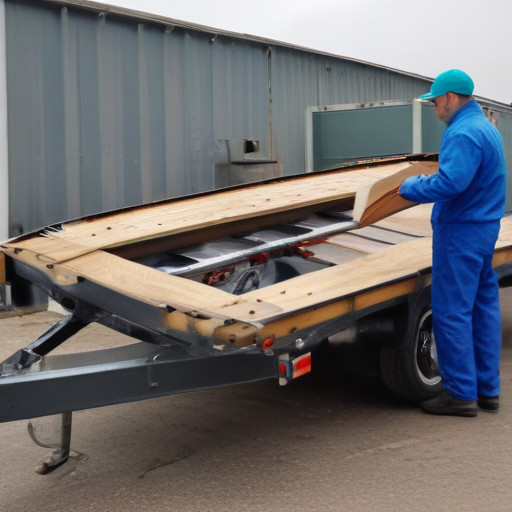
How to use “Boat Trailers”
Using a boat trailer efficiently and safely involves a series of straightforward steps. Here’s a concise guide:
1. Inspect the Trailer: Before use, check the trailer for any signs of wear and tear. Ensure the tires are inflated, lights are functional, and the hitch is secure.
2. Attach the Trailer: Back your vehicle up to the trailer. Align the ball hitch under the trailer coupler, lower the coupler onto the ball, and secure it with the latch pin. Attach the safety chains in a crisscross pattern and connect the trailer lights to your vehicle.
3. Loading the Boat: Position the trailer in the water until the bunks or rollers are submerged but the tires are still on dry ground. Slowly drive the boat onto the trailer, using a winch if needed to pull the boat snugly against the post. Secure the boat with straps to ensure stability.
4. Transporting: Drive cautiously, keeping in mind the added length and weight. Make wider turns, allow extra stopping distance, and regularly check mirrors for trailer stability.
5. Unloading the Boat: Back the trailer into the water, loosen and remove the straps holding the boat. Use the winch to slowly let the boat into the water, guiding it with oars or poles if necessary.
6. Maintenance: After use, clean the trailer to remove salt or debris, which can cause deterioration. Regularly lubricate moving parts and check tire pressure.
By following these steps, you ensure both safety and efficiency when using a boat trailer, contributing to a hassle-free boating experience.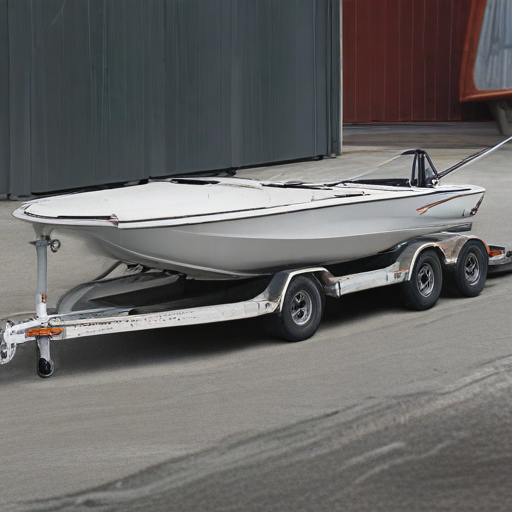
“Boat Trailers” Comparative Analysis
When evaluating boat trailers, several key factors such as type, material, size, and price must be considered. Here, we compare bunk trailers, roller trailers, with a focus on aluminum and galvanized steel constructions.
Bunk Trailers:
These trailers are designed with long, carpeted bunks that support the boat’s hull. They are simple in design, making them cost-effective and easy to maintain. Best suited for shallow-water launch sites, bunk trailers offer excellent hull support, minimizing potential damage. However, loading and unloading can be challenging, especially on steep ramps.
Roller Trailers:
Featuring multiple rollers that facilitate smoother loading and unloading, these trailers are ideal for a variety of water depths. They offer flexibility but require more maintenance due to the many moving parts. Roller trailers also tend to be pricier but provide a better choice for boaters frequently using steep or irregular ramps.
Material Comparison:
*Aluminum Trailers:*
Aluminum is lightweight and resistant to rust, making it ideal for saltwater environments. It offers a higher payload capacity and fuel efficiency. Aluminum trailers are generally more expensive than galvanized steel, but their longevity and reduced maintenance make them a worthwhile investment for regular boaters.
*Galvanized Steel Trailers:*
These trailers are coated with a layer of zinc to prevent rust and corrosion. They are sturdy and cost-effective, making them popular among many boaters. However, they are heavier than aluminum trailers and may not fare as well in corrosive environments such as saltwater, requiring more maintenance over time.
Conclusion:
Choosing between a bunk and roller trailer largely depends on your typical boating environment and frequency of use. For those launching in shallow waters, bunk trailers are a cost-effective and reliable choice. Roller trailers offer enhanced convenience at a higher price point, suitable for diverse ramp conditions. Regarding materials, aluminum trailers are recommended for their durability and light weight, especially in saltwater settings, whereas galvanized steel trailers provide a robust and less expensive alternative. Balancing these factors according to your specific needs will guide you to the optimal trailer for your boat.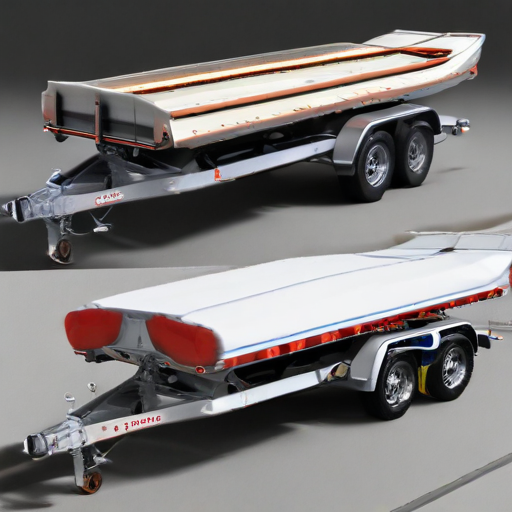
“Boat Trailers” Warranty and Support
Boat Trailers Warranty and Support
When you invest in a boat trailer, our goal is to ensure you receive the highest quality product backed by comprehensive warranty and support services. All our boat trailers come with a standard 3-year warranty that covers manufacturing defects and structural issues, ensuring you can tow your boat with confidence. This warranty includes all critical components such as the frame, axles, and suspension.
To maximize the lifespan of your trailer, regular maintenance is crucial. We provide a detailed maintenance guide and are always ready to assist you with routine checks, lubrication, and adjustments to keep your trailer in optimal condition.
For any issues that arise, our dedicated support team is available via phone or email, offering prompt and knowledgeable assistance. We strive for rapid response times, usually within 24 hours, to minimize any disruption to your boating adventures. In the event that a repair is needed, we provide access to an extensive network of authorized service centers nationwide.
Additionally, our website features a comprehensive FAQ section and troubleshooting guides to address common concerns quickly. If replacement parts are required, we guarantee availability and swift delivery, ensuring you get back on the road as soon as possible.
Your satisfaction is our priority, and we continually seek feedback to improve our products and services. Rest assured, from purchase to post-sale support, we are committed to providing reliable and durable solutions, ensuring your boat trailer performs flawlessly for years to come.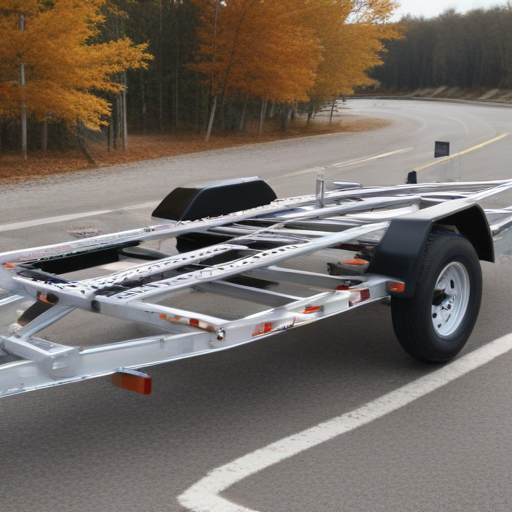
List “Boat Trailers” FAQ
Boat Trailers FAQ
Q1: What types of boat trailers are available?
A: There are primarily two types: bunk trailers and roller trailers. Bunk trailers use long boards (bunks) to support the boat, while roller trailers use multiple rollers to distribute the weight of the boat.
Q2: How do I choose the right size trailer for my boat?
A: Measure the length of your boat from the bow to the stern, including any overhangs. Ensure the trailer’s weight capacity can support your boat’s weight, including fuel, gear, and accessories.
Q3: Do I need a special license to tow a boat trailer?
A: In most regions, you do not need a special license if the total weight of your trailer and boat does not exceed certain limits. Check local regulations to be sure.
Q4: What is the importance of trailer maintenance?
A: Regular maintenance, such as checking tire pressure, inspecting bearings, and ensuring the lights function correctly, prolongs the lifespan of your trailer and ensures safe transport.
Q5: How should I load my boat onto the trailer?
A: Center the boat as much as possible and balance the weight evenly. The bow should rest against the bow stop, and the boat should be securely tied down using straps.
Q6: Are there any specific towing tips for boat trailers?
A: Yes, ensure the trailer hitch is secure and use safety chains. Drive slower than usual, especially on turns and rough roads, and practice braking early to account for the extra weight.
Q7: What should I check before each trip?
A: Verify the tire pressure, check the wheel bearings, ensure all lights and brakes are working correctly, and inspect straps and tie-downs for wear.
Q8: How do I prevent corrosion on my boat trailer?
A: Rinse the trailer with fresh water after exposure to saltwater and apply a corrosion-inhibiting spray. Use marine-grade waterproof grease on moving parts.
These tips and answers should help you understand and maintain your boat trailer, ensuring safe and hassle-free boating experiences.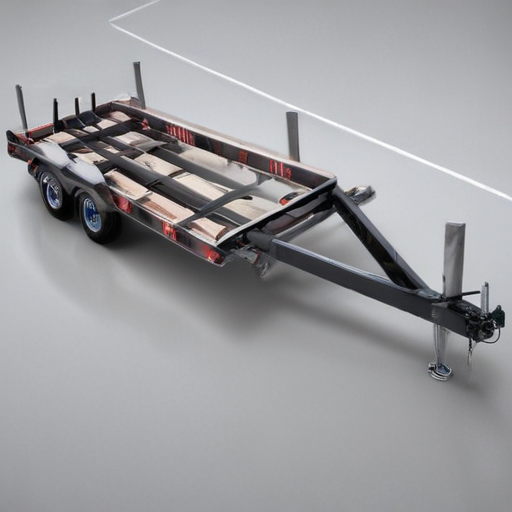
Top 10 FAQ with answer about Boat Trailers for Buyer Sourcing from China
1. Why Source Boat Trailers from China?
Sourcing boat trailers from China can be cost-effective due to the country’s large manufacturing base, skilled labor, and competitive prices. China also offers a variety of options in terms of design and customization to meet diverse customer needs.
2. What Should I Look for in a Manufacturer?
Seek manufacturers with a robust track record, positive reviews, relevant certifications (like ISO 9001), and compliance with international standards like CE or DOT. Visiting the factory for a firsthand look can also be beneficial.
3. How Do I Ensure Product Quality?
Insist on quality checks at various stages of production. Request samples and consider hiring third-party inspection services to ensure the trailers meet your specifications and international standards.
4. What is the Usual Lead Time?
Lead times can vary but typically range from 30 to 60 days, depending on the order size and complexity. Confirm lead times with your supplier to ensure timely delivery.
5. Can I Customize the Boat Trailers?
Yes, most Chinese manufacturers offer customization options, including size, color, material, and additional features. Clearly communicate your requirements to ensure accurate production.
6. What is the Minimum Order Quantity (MOQ)?
The MOQ can vary by manufacturer, often ranging from 10 to 50 units. Discuss MOQs upfront to determine if the supplier can accommodate your needs.
7. How are Shipping and Logistics Handled?
Most manufacturers can manage shipping logistics, including packaging, documentation, and freight forwarding. Choose between FOB (Free On Board) and CIF (Cost, Insurance, and Freight) terms based on your preference.
8. What are the Payment Terms?
Common payment terms include a 30% deposit upon order placement and the remaining 70% upon shipment. Letter of Credit (L/C) and Telegraphic Transfer (T/T) are typical payment methods.
9. Are There After-Sales Services?
Clarify the warranty and after-sales services with your supplier. Reputable manufacturers often offer warranties ranging from 1 to 3 years and provide support for any issues.
10. Can I Visit the Factory?
Yes, visiting the factory is recommended. It provides an opportunity to inspect the production process, quality control measures, and gauge the overall reliability of the supplier.
These FAQs address fundamental considerations and help ensure a smooth sourcing experience for boat trailers from China.

